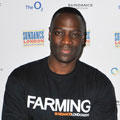(l to r): David Harewood, Minnie Driver, filmmaker Adewale Akinnuoye-Agbaje, Jamie Winstone, Ashley Walters, and Leo Gregory
Nate von Zumwalt, Editorial Coordinator
We’re launching our coverage of the Sundance Film Festival’s journey across the pond at Sundance London with a series of on-the-ground interviews with filmmakers and musicians participating in the celebration of film and music.
English actor and Sundance alum Adewale Akinnuoye-Agbaje (Lost, Oz, G.I. Joe) sounded like anything but the hulking, sometimes menacing characters he depicts on screen as he recalled his Friday table-read at Sundance London. It was another step toward the director’s chair for Akinnuoye-Agbaje, who led a remarkable cast in a reading of his Sundance Lab-supported project Farming to a packed London audience. The script is semi-autobiographical and revisits an era in England when it was common practice for immigrant parents to foster their children to families as they worked toward financial stability. Akinnuoye-Agbaje –still gleaming following the reading and speaking with a palpable enthusiasm—checked in with us to provide a sense of the festival’s atmosphere, his impressions of the event, and the almost eerie aptness of debuting the script at Sundance London.
When you consider the subject matter of Farming, your screenplay reading is one of the more ‘British’ events of the weekend. What was your impression of the audience’s response?
Akinnuoye-Agbaje: This event is painted with firsts. It’s the first time that Sundance has come to London, the first time that a table reading has been done of this nature in England, and it’s the first time that I’ve aired Sundance to the public, particularly the British public. And on all those levels it was quite emotional, and a triumphant feeling. And the audience was just marvelous; the response was phenomenal actually. People laughed in places that I hadn’t anticipated, and applauded in places where I’d hoped. It’s a hybrid between a play and a movie, and I think it’s a real luxury that we should embrace. Because an audience for the first time actually gets to connect with this wonderful cast, these people who they see on their TV, and just to see the workings of how a script is translated into a movie. It’s just a unique experience that you can’t miss, and a very exciting experiment for me to see some of the responses.
You’re always nervous about these things. It’s like sending your kid to school for the first day. You don’t really want to let him go through those gates, but you have to. Fortunately I was guided by the performance of such great actors. The moment they said the first few lines, I was like, “Ok, they’ve got it, I can let my baby go.”
This project is a product of the Sundance Institute Labs and is finally coming to fruition at a Sundance hosted event in your hometown. Could it be any more appropriate?
Akinnuoye-Agbaje: It’s quite mystic really. For it to go through all the stages of the Labs and be a baby that went through the machinery of the Institute… And then for Sundance now to come to London, to bring it home and give it a home-based platform—it’s a gift. Never do you get a platform like that for this type of story. I’m just fortunate to have experienced all of the Labs, and then being able to show that result to my own British public. It’s full circle.
You enlisted the talents of Ashley Walters, Minnie Driver, David Harewood, and many others for this reading. What was it like having that all-star, and very local, cast alongside for this event?
Akinnuoye-Agbaje: It’s really quite surreal to me, to be honest with you. It really was humbling, and it gave me a great sense of gratitude. It’s not an easy journey. It means people have to invest themselves. And to take that from people, and for them to give that freely, it was just a gift, a wonderful honor.
Farming is such an emotional and deeply personal story—do you find it painful to confront, or does it serve as a catharsis?
Akinnuoye-Agbaje: It’s been a five-year journey. It was cathartic for me to write it, and it’s a different level now. Reading had many levels of reaction for me. On an emotional level, because it is my life and something that is personal that I’ve written and lived; and on a creative level, to put it in front of an audience that is your peers and counterparts that grew up in your culture, and would understand some of the references that you’re pointing to. It was just exciting and nerve-wracking at the same time to see how they would react. And I think it was quite positive overall. I’m quite blow away to be honest. But I’m still processing it, because it just happened.
What’s next for this project?
Akinnuoye-Agbaje: I intend to make the film. My plan is to take it to the next step and hopefully it is connected to some of the Institute personnel that attended. And sooner than later, probably in this year, we’ll try to lock funding and get on with a story that needs to be told. And I think judging from the audience reaction, it wants to be heard.




